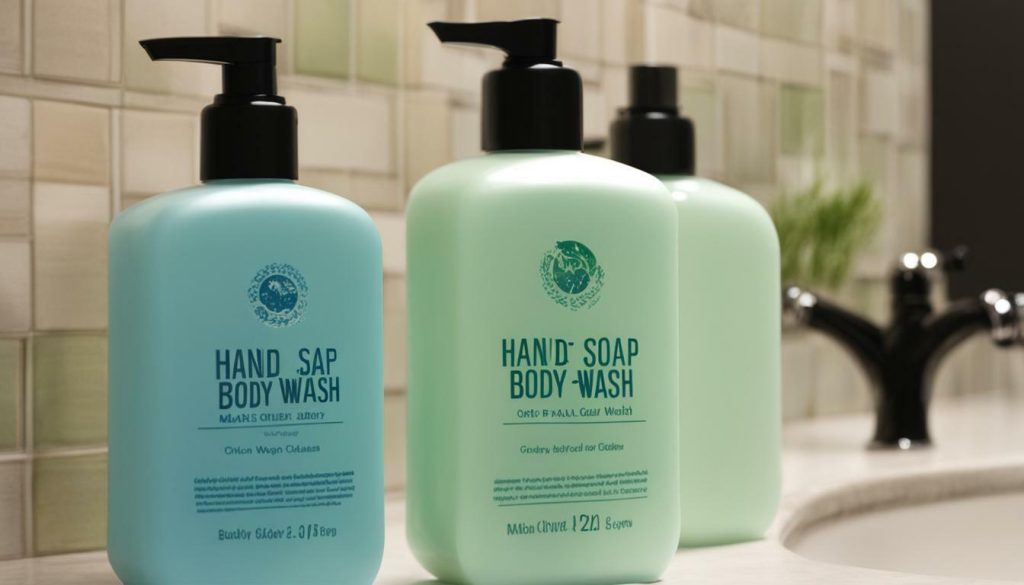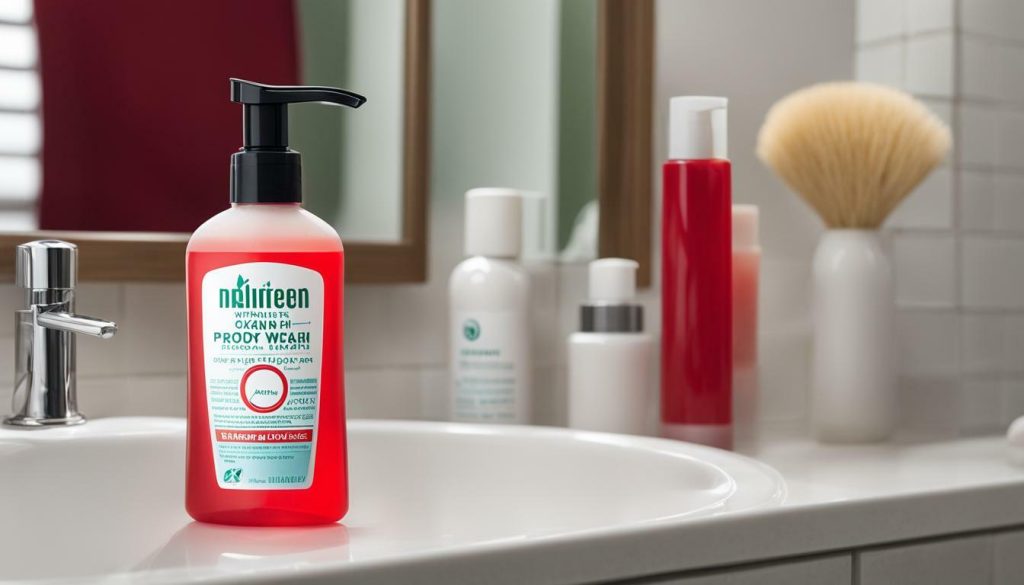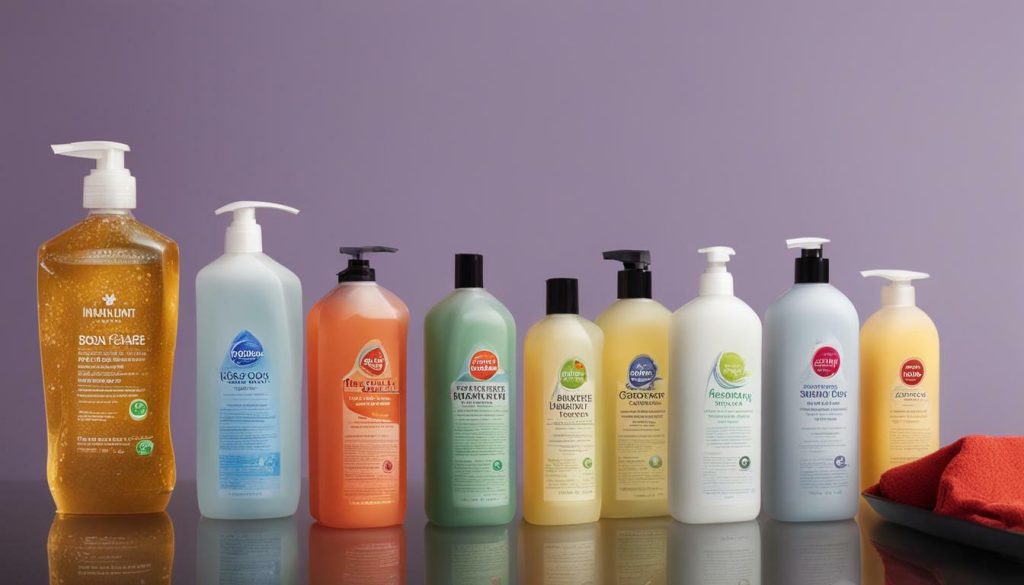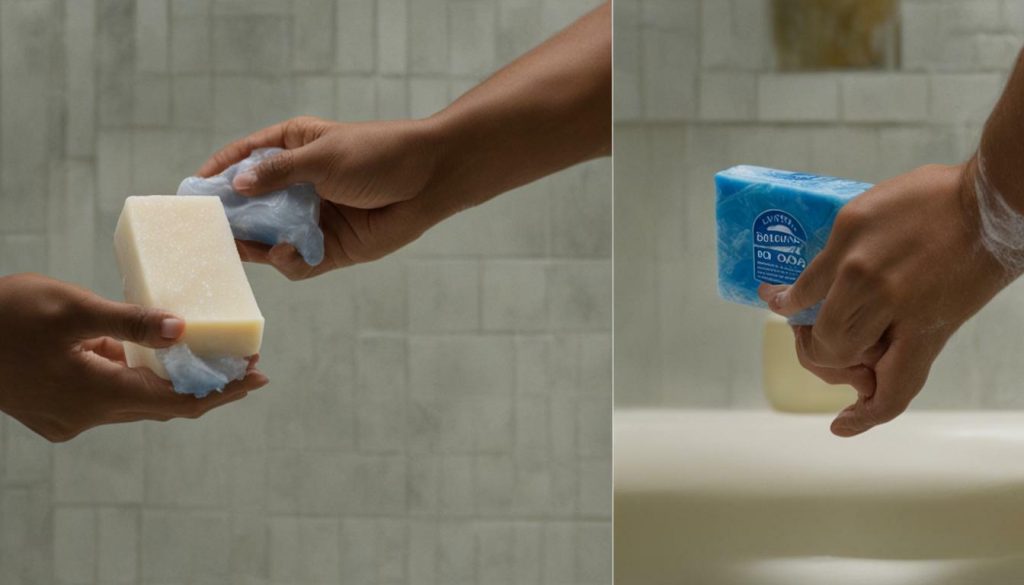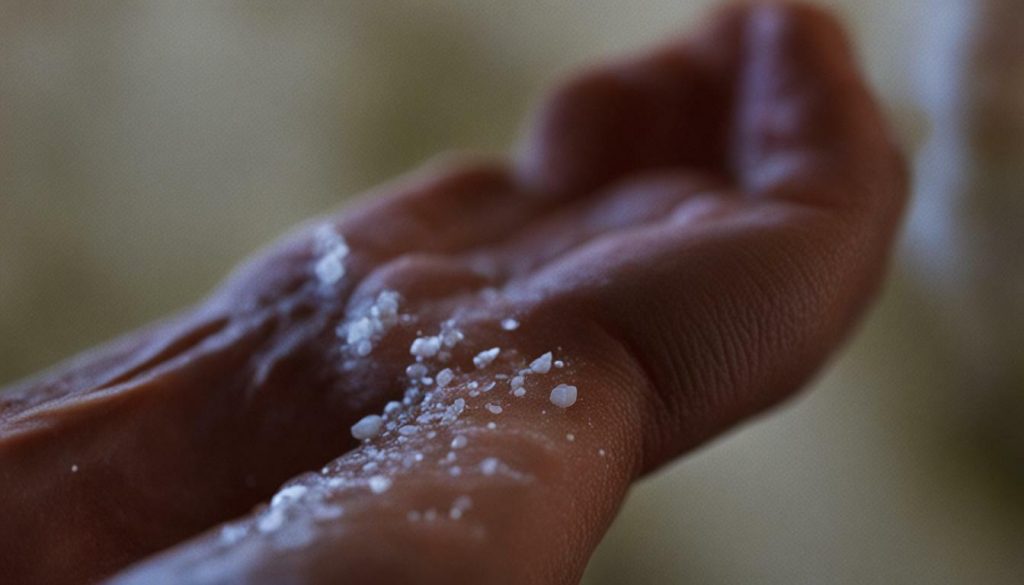When it comes to personal hygiene, it’s essential to use the right products for specific parts of your body. While hand soap and body wash may seem interchangeable, they are formulated differently for a reason. Using hand soap as body wash may seem like a quick fix, but it can have adverse effects on your skin and overall health.
- Hand soap and body wash have different formulations and are intended for different parts of the body.
- Using hand soap as body wash can disrupt the pH balance of your skin, leading to potential irritations and allergies.
- The ingredients in hand soap and body wash can affect the skin differently, with hand soap potentially stripping the skin of natural oils, leading to dryness.
- Cleansing efficiency and hygiene considerations are also factors to consider when choosing the appropriate product for each body part.
- Consulting with a dermatologist and selecting the right products based on your skin type and concerns is essential for maintaining healthy skin.
The Difference Between Hand Soap and Body Wash
While both hand soap and body wash are used for cleaning the skin, they have some significant differences that make them better suited for certain areas of the body.
Hand soap is typically formulated with harsher detergents than body wash to effectively clean away dirt and bacteria from your hands, which are exposed to the outside world and frequently come into contact with germs. The formula is often more basic, with a pH level ranging between 9 and 10, and it may contain stronger fragrances to mask odors. Using hand soap on other parts of your body may cause dryness and irritation since it can strip your skin of its natural oils.
On the other hand, body wash is designed to be gentler on the skin and formulated with moisturizing agents to prevent dryness. It often has a pH level ranging between 5.5 and 7, which is closer to the skin’s natural pH, and may contain milder fragrances or none at all. Body wash is ideal for areas of the body with more sensitive skin, such as the face, chest, and genitals.
In summary, hand soap and body wash have distinct differences in formulation, intended use, and impact on the skin. Using hand soap as body wash can cause dryness and irritation, while body wash may not be strong enough to effectively clean your hands.
The pH level of your skin plays a crucial role in maintaining its health and function. The pH scale measures the acidity or alkalinity of a substance, with the neutral point being 7.0. The skin’s natural pH level is around 5.5, which is slightly acidic. This acidity is important because it helps to create an environment that inhibits the growth of harmful bacteria and fungi while maintaining the skin’s natural protective barrier.
When you use a product with a different pH level than your skin’s natural pH, it can disrupt this delicate balance, leading to potential skin irritations or allergies. This is especially true for those with sensitive skin.
Hand soap and body wash differ in their pH balance, with hand soap being generally more alkaline due to the need for more powerful cleansing agents. On the other hand, body wash is formulated to have a balanced pH level that is gentle on the skin.
It’s essential to avoid using hand soap as body wash to preserve the skin’s pH balance. Doing so can lead to a higher risk of skin irritation, dryness, and even skin infection.
Differences in Ingredients
One of the key distinctions between hand soap and body wash is the difference in their formulation and ingredients. Hand soap is designed to remove dirt and bacteria from your hands, while body wash is formulated to cleanse your entire body. As a result, the ingredients used in each product vary.
Hand soap typically contains more harsh detergents and chemicals, such as sodium lauryl sulfate (SLS) or sodium laureth sulfate (SLES), which can be drying and irritating to the skin. These ingredients are added to hand soap to provide a deeper cleanse and remove stubborn dirt and grime.
In contrast, body wash generally contains milder cleansing agents and more moisturizing agents, such as glycerin, coconut oil, or shea butter. These ingredients help to hydrate and nourish the skin while cleansing, leaving it feeling soft and smooth.
Differences in Ingredients
If you have sensitive skin, it is essential to carefully examine the ingredients in both hand soap and body wash to ensure the product will not trigger an allergic reaction or cause irritation. Opting for fragrance-free or hypoallergenic options may be beneficial if you have sensitive skin.
Effects on Skin Moisture
One critical difference between hand soap and body wash is their impact on skin moisture levels. Hand soap is often formulated to remove heavy dirt and grime from the hands, which means it typically contains harsh detergents that can strip the skin of its natural oils. This can leave your skin feeling dry and tight, especially if you use it as a body wash. On the other hand, body wash is designed to cleanse and moisturize the skin, and often contains moisturizing agents that can help to hydrate and soothe dry skin.
Regular use of hand soap as a body wash can disrupt the natural moisture balance of your skin, leading to dryness and irritation. If you have sensitive skin, this can be particularly problematic, as it can aggravate existing skin conditions and cause redness and flakiness. To maintain healthy skin moisture levels, it’s important to choose a body wash that’s specifically designed for your skin type and concerns.
When it comes to cleansing the skin, the type of product you use can have a significant impact on the effectiveness of the process. Hand soap and body wash are formulated differently, and as a result, their cleansing efficiency may vary.
Hand soap is generally designed to remove dirt and bacteria from your hands quickly and efficiently. However, it may not be as effective in removing other impurities like sweat and oil from the body. On the other hand, body wash is specifically made for cleansing the entire body, including the face, and is formulated to be gentle enough for everyday use.
To ensure maximum cleansing efficiency, it’s essential to use the appropriate product for each area of your body. Using hand soap as body wash may not adequately remove all the impurities, leading to an inadequate cleansing process. If you have sensitive skin, using hand soap may cause irritation and dryness, and it may not be the best option for you.
For best results, use body wash for your body and face and use hand soap for your hands only. This will help you achieve optimal cleansing efficiency and promote healthy skin.
While it may be tempting to use hand soap as a substitute for body wash, doing so can have negative effects on your skin’s health and appearance. Here are some potential skin issues that may arise:
Dryness and Irritation
Hand soap is typically formulated for frequent hand washing, which means it contains harsher detergents that can strip the skin of its natural oils. Using hand soap as body wash can lead to dryness, itchiness, and irritation, especially if you have sensitive skin.
Hand soap may also contain fragrances and other irritating ingredients that can cause redness and inflammation when used on the body.
Compromised Skin Barrier Function
The skin barrier is responsible for protecting the body from environmental stressors and retaining moisture. Using the wrong type of soap can compromise this function, making the skin more vulnerable to damage and infection.
Overall, it’s best to use products that are specifically formulated for the body to avoid these potential skin issues. Your skin will thank you!
Hygiene Considerations
When it comes to maintaining hygiene, using the right products for each area of your body is crucial. Hand soap and body wash differ in their formulation, which can impact their effectiveness in cleansing and their impact on your skin’s health. While hand soap is designed for use on the hands, body wash is formulated for use on larger areas of the body, such as the arms, legs, and torso.
Using hand soap as body wash can lead to various hygiene issues, including the spread of bacteria and viruses. Hand soap is formulated to remove dirt, grime, and germs from your hands, but it may not be effective in cleansing larger areas such as your back, chest, or legs.
To ensure optimal hygiene, it is important to use the appropriate product for each area of your body. Use hand soap for your hands and body wash for larger areas of your body. This helps to remove dirt, oil, sweat, and bacteria, keeping your skin clean and healthy.
If you’re unsure about the appropriate products to use for different parts of your body, it’s always best to consult with a dermatologist. They can provide valuable insights into your specific skin concerns and recommend suitable products to improve skin health and hygiene.
When it comes to using hand soap as body wash, dermatologists advise against it. Hand soap is formulated for the hands, which have thicker skin and are exposed to different types of bacteria than other parts of the body. Using hand soap as body wash can disrupt the pH balance of your skin and strip its natural oils, leading to dryness and potential irritation.
According to Dr. Lisa Chipps, a board-certified dermatologist, “Hand soap may contain harsher detergents and sls (sodium lauryl sulfate), which can further compromise the skin barrier.” This can weaken the skin’s ability to protect itself from environmental stressors and increase the risk of skin damage and infection.
On the other hand, body wash is formulated to be gentler on the skin and can provide moisturizing benefits. “Body wash is typically less drying and can contain more moisturizing agents to help hydrate skin better than hand soap,” says Dr. Mona Gohara, a board-certified dermatologist.
Overall, it’s essential to use the right products for specific body parts to maintain skin health and hygiene. Consulting with a dermatologist and selecting appropriate hand soap and body wash based on your skin type and concerns can help ensure optimal skin health and prevent potential skin issues.
Choosing the Right Products
When selecting the right hand soap and body wash, it’s important to consider your skin type, concerns, and personal preferences. Keep in mind that the needs of your hands and the rest of your body differ, and using the wrong product can lead to potential skin issues.
If you have sensitive skin, opt for gentle, fragrance-free products that are designed for sensitive skin. Look for ingredients like glycerin and aloe vera, which can help soothe and moisturize the skin. If you have oily skin, choose a body wash with salicylic acid or benzoyl peroxide to combat acne and excess oil. For dry skin, select a moisturizing body wash with ingredients like shea butter or ceramides to lock in moisture.
When it comes to hand soap, choose a formula that is designed to clean and moisturize the hands without stripping them of natural oils. Look for products labeled as “moisturizing” or “hydrating” that contain ingredients like coconut oil, jojoba oil, or vitamin E.
To ensure optimal skin health, avoid using hand soap as body wash and vice versa. Stick to using each product as intended, and always rinse thoroughly with water to remove any residue.
By choosing the right hand soap and body wash for your needs, you can maintain healthy and hygienic skin from head to toe.
Conclusion
Now that you have a better understanding of the differences between hand soap and body wash, as well as their impact on your skin’s health and hygiene, it’s clear that choosing the right products for specific body parts is essential.
Using hand soap as body wash can disrupt your skin’s pH balance, strip it of natural oils, and lead to potential skin irritations and allergies. On the other hand, body wash is formulated to cleanse and moisturize the skin without compromising its natural protective barrier.
Expert Tips
Dermatologists recommend selecting products based on your skin type, concerns, and personal preferences. If you have sensitive skin, look for gentle, fragrance-free formulas that won’t cause irritation. If your skin is dry, opt for moisturizing body washes that contain natural ingredients like aloe vera or shea butter.
Additionally, it’s important to practice proper hygiene and use the appropriate product for each area of the body to prevent the spread of bacteria and maintain cleanliness.
By following these expert tips and selecting the right products for your skin, you can help ensure optimal skin health and hygiene, leaving you with soft, nourished, and healthy-looking skin.

Hey there! I’m Dr. Mary Noland, your trusted authority in dermatology. My 17-year rollercoaster ride in skin science has been nothing short of a masterclass. Whether you’re a newbie or a familiar face, I’m here with open arms and Medicare-friendly services, dedicated to creating your perfect skin haven.
But hold up! There’s more to me. When I’m not elbow-deep in dermatology, I’m lighting up derma blogs with insights that peel back the layers of skin health. Also, as the proud captain of ‘buybodywash.com‘, I provide all the body care goodness you need!
Trust me; I’m more than just a white coat. I’m here to lend an ear, share a laugh, and bring calm with a reassuring voice that’s comforted countless patients.
So, meet Dr. Mary Noland – your dermatologist and your guide and friend on the path to radiant skin. I am excited to meet you soon!


